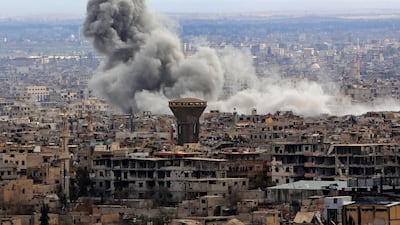The Russian jets bombarded the city with a ferociousness that shocked even seasoned observers of the Syrian civil war. With hundreds of thousands of civilians trapped, the international community expressed anger, warning that the bombings must end. Terrible images filled western newspapers and television channels, fuelling an impotent rage from the West. And then, in the midst of the carnage, Moscow announced a humanitarian pause that would allow civilians to leave.
This description is not of Eastern Ghouta over the past week, but of eastern Aleppo in the winter of 2016. While the world is focusing on the siege of Ghouta and the estimated 400,000 civilians trapped there, it has been almost forgotten that exactly the same events took place in Syria's largest city nearly 18 months ago.
The playbook is exactly the same and this is no coincidence. Now, as then, airstrikes shatter the besieged areas, leading to hundreds of deaths, widespread publicity and a call for "something to be done". In the midst of the carnage, Russia declares a brief daily ceasefire – in Aleppo it was eight hours a day, the one announced on Monday in Ghouta is five hours. (The aim of the "pause" announcement is to showcase Russia as a powerful party that understands the humanitarian crisis. In Aleppo, it was announced by a Russian official. This time, a month away from elections, it was announced by Vladimir Putin himself.)
In tandem with the pause comes the creation of a humanitarian corridor. There are then weeks of negotiations over who will leave and in what manner. The corridors are opened and then closed; some are subject to attack. But in the end, the civilians leave and the area is retaken by the Assad regime.
Those final steps have not yet happened in Eastern Ghouta, only the proposal for a humanitarian corridor has been aired. But it will happen, most likely in a matter of days if not weeks. The playbook worked well for the regime and the Russians in Aleppo and they intend to do it again.
The world is focusing on Ghouta and the horrors of the siege as if they were unique crimes – but they are anything but. Indeed, this is part of a long-standing plan by the regime to neutralise any threat to Damascus and the seat of the regime's power. With the international community's involvement now reduced to mere words, the Assad regime knows that nothing will be done to stop that plan unfolding.
Ghouta is the last rebel-held area close to Damascus and the regime will be glad to see it fall back into its hands. But there is a secondary reason why the enclave has been targeted now. With less than a month to go before Russian elections, Mr Putin wants to ensure nothing taints his (widely expected) victory.
He is particularly concerned about an “October surprise” – the phrase given to a sudden, dramatic revelation in the last weeks of a US presidential election that potentially swings the result. It is almost impossible to imagine a “March surprise” changing the Russian election results – every major Russian poll conducted in February shows Mr Putin with an insurmountable lead, with not a single one of his competitors breaking into double-digit support – but Mr Putin is aware that the war still has the possibility to shatter the sheen of victory.
Just three weeks ago, Russian mercenaries were involved in a botched raid in eastern Syria, which Moscow admitted claimed the lives of "several dozen" of its citizens. For Mr Putin, victory in Syria is part of a narrative showing him personally responsible for a stronger Russia, one able to face down, as he sees it, the revolutions fomented on Russia's borders by the West and expand its power abroad.
A successful attack on the Syrian capital – and rebels from Ghouta have already fired mortars into Damascus – would undo that narrative. So too would a messy entanglement with one of the other militaries in the Syrian conflict. The botched raid outside Deir Ezzor at the start of February is a good example: it involved not only US-backed Kurdish forces, but also US troops, marking the first time both have clashed inside Syria. Both Moscow and Washington have remained silent on the issue.
So there are still dangers for Mr Putin in Syria, which is why Moscow wants the conflict to move rapidly from a military campaign to a political one. A “hot war” in Syria – one that involves guns, tanks and fighter jets – is too risky for Mr Putin. He was seeking a victory in Syria at a low cost. But the other countries involved – Iran, Israel, Turkey – have a much longer timeline and much more to both gain and lose.
For now, Mr Putin is focused on turning the conflict from a military campaign into a political one. That will be harder than it seems – as the Sochi conference last month, when delegates heckled Russia's foreign minister, shows – but will easier to manage with the Russian public and the international community, which remain his primary interests.
Once the military campaign is over, splits will show up between Damascus and Moscow. But for now, they are in complete agreement, protecting Damascus from any rebel fire, regardless of the cost in Syrian lives and political reputation. The regime and its backers are barreling towards the next stage in the Syrian civil war, using the same roadmap that guided them in Aleppo – and, for them, the only way to get there is through the rubble of Ghouta.


